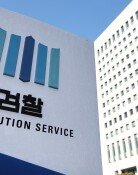Tax Revenue Deficit, Higher Construction Costs Force Education Offices to Issue Bonds Worth Three Trillion Won
Tax Revenue Deficit, Higher Construction Costs Force Education Offices to Issue Bonds Worth Three Trillion Won
Posted September. 22, 2005 07:44,
The construction of schools in newly developed apartment complexes and declining educational tax revenues caused by the economic slump have put public educational finances in trouble.
As a result, 16 cities and local governments offices of education have been forced to issue local bonds worth three trillion won this year.
The Ministry of Education and Human Resources Development announced on September 21 that 16 cities and local educational offices nationwide issued local bonds totaling 2.999 trillion won: 1.0386 trillion won for Seoul, 632.1 billion won for Gyeonggi, 253.7 billion won for Busan, 210.4 billion won for Daegu and 117 billion won for Gyeongnam.
The need to issue more local bonds arose mainly from the construction of new schools, deficits in educational tax revenues and the amended local educational finance subsidy act.
In particular, the construction of a large number of schools since 2002 driven by a national project to improve the educational environment and property development has been blamed for education office financial problems.
Building a school costs an average of 25 billion won, including 10 billion won for purchasing property and 15 billion won for construction. Last year, 213 new schools were built, and this year another 199 are scheduled to be built. About 2.4 trillion won has been set aside for constructing new schools this year, and 934.7 billion won of that will be funded by issuing local bonds.
Due to the economic slowdown, the shortfall in educational tax revenues is estimated to be 720 billion won. For 420 billion won of that shortfall, local bonds will be issued, and the rest will be funded by issuing national bonds.
The Ministry of Education decided to stop providing subsidies for teachers salaries in December last year when it amended the local educational finance subsidy act. In response to the governments move, some lower-level local governments have been refusing to offer statutory subsidies for teachers salaries, citing that the government has the responsibility to finance teachers salaries for middle schools themselves because middle school education is mandatory. The tension created by this is another cause for worsening educational finances.
Seoul metropolitan city filed a lawsuit to prove that it has no obligation to provide statutory subsidies for teachers salaries worth 265 billion won. So the Seoul metropolitan office of education had to issue local bonds to finance teachers salaries.
Furthermore, some educational offices are pursuing populist projects that are not urgent. For example, the Seoul City office of education has a plan to equip all primary, middle and high schools with state-of-the-art heating and cooling systems next year and the project is estimated to cost 95.6 billion won.
The Ministry of Education and Human Resources Development stands by its position that fundamental financial problems cant be solved unless the properties for newly built schools are provided for free or at affordable prices.
The Ministry is engaged in consultations with the Ministry of Construction and Transportation on revising the special law on securing school properties so that property can be secured at 50 percent of the total construction cost for primary and middle schools, and 70 percent of the cost for high schools.
In addition, the Ministry of Education and Human Resources Development plans to decide whether to issue local bonds case by case, a major departure from the existing practice of reviewing issuance of local bonds based on the total amount. In other words, if a project is not urgent, it wont get funding.
A source from the ministry said Due to the shortfall in educational finances, it is very hard to keep school operation budgets at their current level or to secure additional budget money for repair or renovation of schools, adding, We have no other option but to tighten our purse strings for the next three to five years.
In-Chul Lee inchul@donga.com



![“한동훈, 정치생명 걸고 무소속 출마해 평가받는 것 고려할만”[정치를 부탁해]](https://dimg.donga.com/c/138/175/90/1/wps/NEWS/IMAGE/2026/01/19/133186982.1.jpg)



